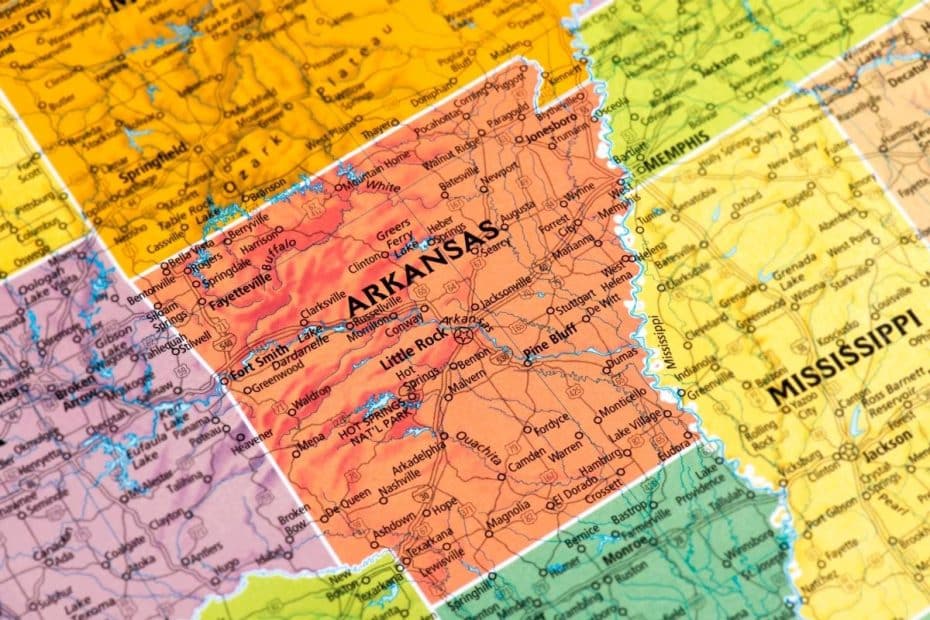Arkansas is home to the Buffalo National River, the Crystal Bridges Museum of American Art, and Hot Springs National Park, not to mention popular cities and towns such as Fort Smith, Eureka Springs, and Little Rock.
You’d like to capture the beauty of Arkansas using your drone, but what are the laws?


Arkansas permits drone use but does have laws on a federal and state level that drone pilots must follow. State-level drone laws in Arkansas prohibit recording someone with a drone when they expect privacy, as well as capturing critical infrastructure information with your drone.
In today’s guide, we’ll go over every drone law in the great state of Arkansas so you can be on the up and up.
This article is for those who live in Arkansas and are new to drones as well as seasoned drone pilots traveling down south. Keep reading!
Arkansas Drone Laws
To reiterate our point from the intro, Arkansas does welcome drone pilots within its state borders. Drone pilots of all kinds must obey federal, state, and – to some extent – local laws on how you can and cannot operate a UAV.
Let’s take a closer look now.
Federal Level
All states within the United States are subject to drone laws as federally mandated by the US government, specifically the Federal Aviation Administration or FAA.
These federal drone use laws are the same from state to state, though individual states may add more regulations on top of those.
Here’s what you need to know.
Agency drone operations
Those who have been hired for a drone-related job in Arkansas such as operating a UAV for a fire department or police department have a special set of laws to follow.
Federal law requires you to familiarize yourself and always abide by the Federal Aviation Administration or FAA’s Part 107 laws aka the Small Unmanned Aircraft Systems (UAS) Regulations.
In some instances, you might also be required to obtain a Certificate of Authorization or COA, which is federally issued to some drone pilots.
Be sure to ask your employer whether you need a COA before you launch your drone in Arkansas.
Commercial pilots
Commercial pilots may also earn money from flying their drones even though they don’t work for police or fire departments.
In Arkansas, the federal rules mandate that you are subjected to FAA Part 107 rules and regulations at all times when flying your drone.
More than that, before you’re allowed to legally fly your drone for commercial gain, you must take the FAA Part 107 exam.
For those not familiar, the Part 107 exam is a test that challenges a drone pilot’s full scope of knowledge about when to fly, where, and in what conditions.
You must pass the test if you want your Part 107 license, which is required for commercial drone pilots.
The Part 107 license is good for two years from the date it’s issued.
The license applies to any state in the US so even if you earned your license in another state, it still applies when using your drone commercially in Arkansas.
We’ve reviewed nearly every online drone school with Part 107 exam prep right here on the blog.
If you need some extra help readying yourself for the exam, those reviews ought to help you choose the right online school for you!
Recreational pilots
Finally, federal drone law applies to recreational drone pilots in Arkansas or those who like to use their drones for fun.
You have to take an exam as well, but don’t worry, as it’s not nearly as high-pressure as the FAA Part 107 exam. The exam for recreational drone pilots is known as The Recreational UAS Safety Test or TRUST.


Unlike the Part 107 exam, the test is free to take. You also can’t fail the exam, as the correct answer for any question you answer incorrectly is displayed. Then you have the opportunity to choose the right answer and move on to the next question.
Even after passing the TRUST exam, you’re still expected as a recreational drone pilot to always follow FAA UAV rules.
State Level
Arkansas also imposes a few drone restrictions on a state level. The three state laws to know are the Arkansas State Parks – State Park Regulation, HB 1349, and HB 1770.
Let’s take a closer look at these three laws now.
Arkansas State Parks – State Park Regulation // 2018
As of 2018, the Arkansas State Parks – State Park Regulation mandates that drone pilots must have a written permit allowing them to fly their drone in any of the state parks throughout Arkansas.
The State Park Regulation has two acts of note, Act 1019 – Surveillance of Critical Infrastructure and Act 293 – Voyeurism.
According to Act 293 – Voyeurism, drone pilots cannot use a drone for voyeuristic purposes. In other words, no spying on your neighbors (or anyone else).
Act 1019 – Surveillance of Critical Infrastructure states that it is “unlaw to photograph, record, or conduct surveillance on anything defined as ‘critical infrastructure,’ defined as: an electrical power generation or delivery system; A petroleum refinery; A chemical or rubber manufacturing facility; or A petroleum or chemical storage facility.”
That rule is pretty cut and dried, we’d say!
HB 1349 // 2015
Another state-based Arkansas drone law is HB 1349, which was put into effect in 2015.
According to Section 1. Arkansas Code § 5-16-101(b), “It is unlawful to knowingly use an unmanned vehicle or aircraft, a camcorder, a motion picture camera, a photographic camera of any type, or other equipment that is concealed, flown in a manner to escape detection, or disguised to secretly or surreptitiously videotape, film, photograph, record, or view by electronic means a person:
- For the purpose of viewing any portion of the person’s body that is covered with clothing and for which the person has a reasonable expectation of privacy;
- Without the knowledge or consent of the person being videotaped, filmed, photographed, recorded, or viewed by electronic means; and
- Under circumstances in which the person being videotaped, film, photographed, recorded, or viewed by electronic means has a reasonable expectation of privacy.”
This law just happens to lump drones in with other means of recording people, such as using your smartphone. That said, it’s a good law from a safety and security standpoint, as any person who is out in public has a reasonable expectation of both.
What the HB 1349 law means for you the drone pilot is that you should always ask anyone who’s going to appear in your drone footage–video, photo, or otherwise–if they’re okay with being in your drone footage.
If they say no, then you should vacate the premises and use your drone elsewhere.
In Section 2. Arkansas Code § 5-16-102(b), the HB 1349 law gets into the prohibition of voyeurism “without the consent of each person who is present in the private place, personally or through the use of an unmanned vehicle or aircraft, looks into a private place that is, or is part of, a public accommodation, and in which a person may reasonably be expected to be nude or partially nude.”
In other words, no drones in restrooms or changing rooms.
HB 1770 // 2015
Lastly, there’s HB 1770, another Arkansas state law that was passed in 2015.
In Section 1. Arkansas Code Title 5, Chapter 60, Subchapter 1, 5-60-103. Unlawful use of unmanned aircraft system. The rules are as follows.
If a federal government representative is using the drone, they must be “acting pursuant to contract with the federal government to conduct surveillance of specific critical infrastructure,” with critical infrastructure being defined the same way as before.
In Section 2, Arkansas Code Title 16, Chapter 118, 16-118-111. Civil actions against operators of an unmanned aircraft system., punishments are decided for those who disobey HB 1770.
That person is subject to: “(1) Any actual damages sustained as a result of the violation, or ten thousand dollars ($10,000), whichever is greater;
(2) Three (3) times actual damages, or ten thousand dollars ($10,000), whichever is greater, in a case in which the violation resulted in profit or monetary gain; and
(3) The costs of an action brought under this section, together with reasonable attorney’s fees as determined by the court.”
In other words, definitely do not use your drone to steal infrastructural information in Arkansas. It will cost you!
Local Level
Although it’s likely that specific cities or areas in Arkansas have drone usage laws that apply on a local level, we were unable to find any specific laws to report.
That doesn’t mean you can fly your drone scot-free. Be sure to check in with the city or town you’re staying or living in and ask where you can and cannot use your drone.
Arkansas Drone Flight FAQs
You’ve got your drone set up and you’ve chosen a gorgeous place in Arkansas to fly, but you want to double-check that you’re on the right side of the law. This FAQs section ought to come in handy!
Can I Fly a Drone in a Public Park in Arkansas?
None of the laws and restrictions on drone use that are currently active in Arkansas apply to public parks. Thus, you should be able to fly your drone in one of the 50+ public parks throughout the state.
Just look around first while in a public park to make sure there are no signs designating the area a “no drone zone”.
All that said, you must remember Arkansas’ laws about voyeurism and unlawfully capturing critical infrastructure information using your drone before you set out to a park to fly.
You’re also still subject to all of FAA’s drone flight rules per the federal restrictions on drone flight that Arkansas imposes.
Can I Fly a Drone in a State Park in Arkansas?
Arkansas is home to many state parks, including the Bull-Shoals White River State Park, Cane Creek State Park, Daisy State Park, DeGray Lake Resort State Park, Lake Catherine State Park, Logoly State Park, and Village Creek State Park.
However, per the Arkansas State Parks – State Park Regulation, you need a written permit to fly in any of these state parks as well as the others throughout the state.


